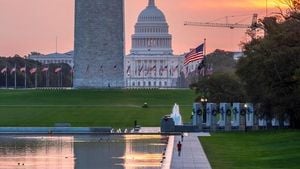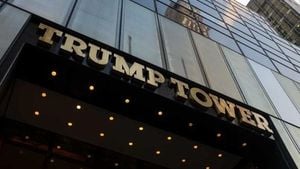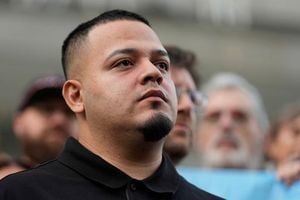The tragic story of Genesis Giovanni Mendoza-Martinez, who lost his life during what was meant to be a straightforward drive, shines light on the relentless debate surrounding Tesla's Autopilot feature. Genesis, only 31, died on February 18, 2023, when his Tesla Model S collided with a fire truck on the outskirts of San Francisco. Now, his grieving parents are taking legal action, targeting not just Tesla as the car manufacturer but also CEO Elon Musk, whom they accuse of promoting misleading claims about the vehicle's self-driving capabilities.
According to the lawsuit filed by Mendoza-Martinez's parents, Eduardo and Maria, the young man believed wholeheartedly he was using the Autopilot mode, which had been marketed as capable of safely driving on public roads without direct human control. They allege this was based on previous statements by Musk and Tesla's own marketing materials, which suggested the vehicle was superior to human drivers.
On the day of the accident, Genesis was reportedly behind the wheel, attempting to navigate the busy freeway. Tragically, his car hit the fire truck, which had responded to another incident, coming to rest with its emergency lights activated, parked diagonally on the highway. While Genesis sustained fatal injuries, his brother, Caleb, survived with less severe harm, and four firefighters were also hurt.
"The time is coming due for Tesla to be held to account," said Brett Schreiber, the attorney representing the Mendoza family. He emphasized the family's belief not just in the tragedy of loss, but also the need for justice for the apparent mishandling of the technology involved.
Genesis’s parents contend their son had trusted the Autopilot feature, convinced by not only Tesla’s advertisements but also by Musk’s enthusiastic endorsements over the years. For them, the crash wasn’t merely the capricious hand of fate but rather something much more sinister—a mechanical failure underpinned by corporate negligence.
The lawsuit indicates Genesis had absorbed the pervasive messaging surrounding Tesla's self-driving technology through various media channels, believing the Autopilot feature to be significantly safer than the average human driver. The complaint stated, "Not only was he aware of the technology being called ‘Autopilot,’ he saw, heard, and/or read many of Tesla or Musk’s deceptive claims on Twitter, Tesla’s official blog, or the news media." They also note Genesis genuinely thought the enhanced system could navigate highways autonomously and safely.
The unfortunate irony is the Advanced Driver Assistance System, marketed under the Autopilot banner, misread the emergency vehicles at the scene of the crash. The lawsuit explained the system perceived the fire truck as “a single frame” which was too bright or too dark, impairing its ability to recognize the hazards before it. This kind of mistake, which seemed to stem from Tesla’s unjustly rushed features, highlighted significant flaws—issues the company allegedly knew about yet failed to address.
The grave repercussions of Genesis’s crash have drawn attention not only from the involved parties but also from public regulators. The National Highway Traffic Safety Administration (NHTSA) has now launched investigations targeting other similar incidents. They’ve identified 16 accidents involving Teslas on Autopilot hitting emergency vehicles over the past six years, resulting in one fatality and numerous injuries. This information steadily underlines deep-seated worries about the Autopilot feature's reliability.
Supporters of the Mendoza family are hitting back against Tesla’s defense, which suggests some drivers might have been negligent or misusing their equipment. Tesla's claims include statements such as, "The alleged incident, injuries, losses, and damages were caused by misuse or improper maintenance of the subject product, which were not foreseeable to Tesla."
Still, the Mendoza family seeks to show Tesla consciously concealed problems with its Autopilot system, asserting the company embarked on "a widespread campaign" to downplay the flaws, exploiting non-disclosure agreements to keep consumers quiet about complaints related to unintended braking, sudden acceleration, and crashes leading to bodily harm. Their lawsuit expresses dismay at reportedly thousands of issues logged between 2015 and 2022, including 1,000 crashes and 1,500 complaints relating to sudden stops.
"Like so many, Mr. Mendoza believed the misrepresentations, half-truths, and lies of Tesla about what its autopilot technology could do," attorney Schreiber remarked. Genesis's case embodies themes of misplaced trust underscored by newer, untested technologies introduced to the commercial market, and raises questions about corporate accountability within the burgeoning electric vehicle industry.
The narrative underscoring this tragedy goes beyond simply assessing culpability. It relates closely to burgeoning fears about driver autonomy and the systems we are beginning to rely upon daily. Technology is progressing at breakneck speed, yet as shown by Genesis's unfortunate fate, the accompanying safety standards and regulations often seem to lag behind. The incident reaffirms the importance of ensuring both manufacturers and consumers approach automated systems with transparency, safety, and training.
It’s important to highlight the fundamental question here: just how much can we trust these vehicles we throw our lives behind as they traverse the roads? Gemini’s life marked the precarious balance of innovation and safety and serves as both a cautionary tale and call to action for stricter regulation and accountability.
The Mendoza family's story is not just about loss. It’s part of the larger dialog on how new automotive technologies are integrated, understood, and regulated. Above all, it beckons for sensitivity from manufacturers, as well as deep accountability measures, ensuring no future driver will face the same heartbreak with their families forever scarred by the unchecked technologies of today.



